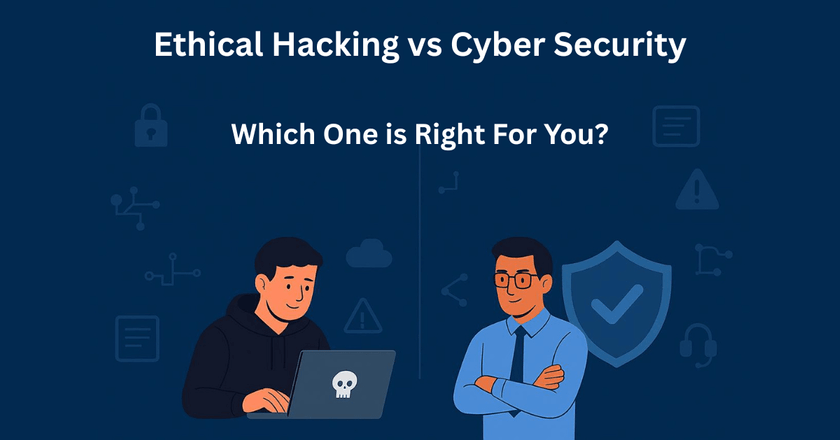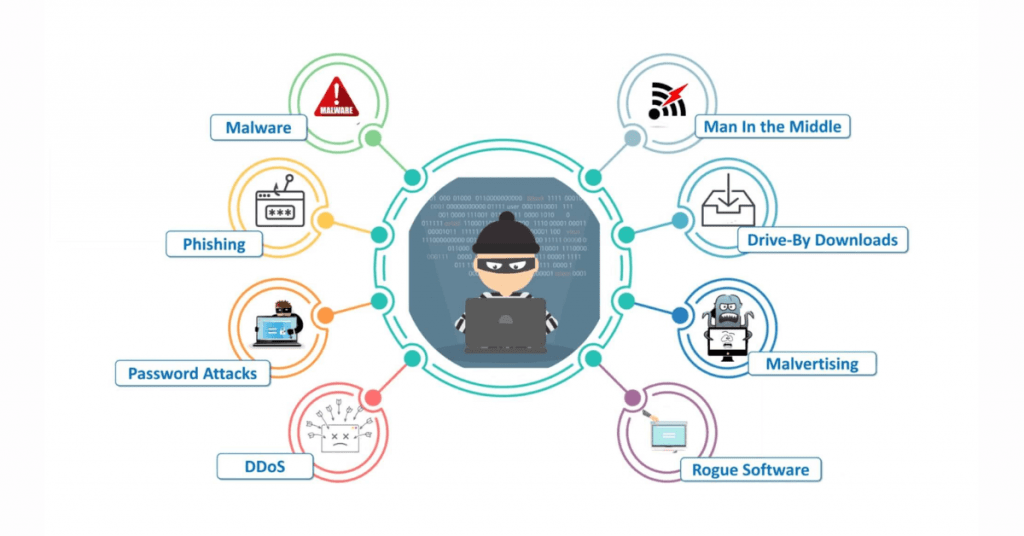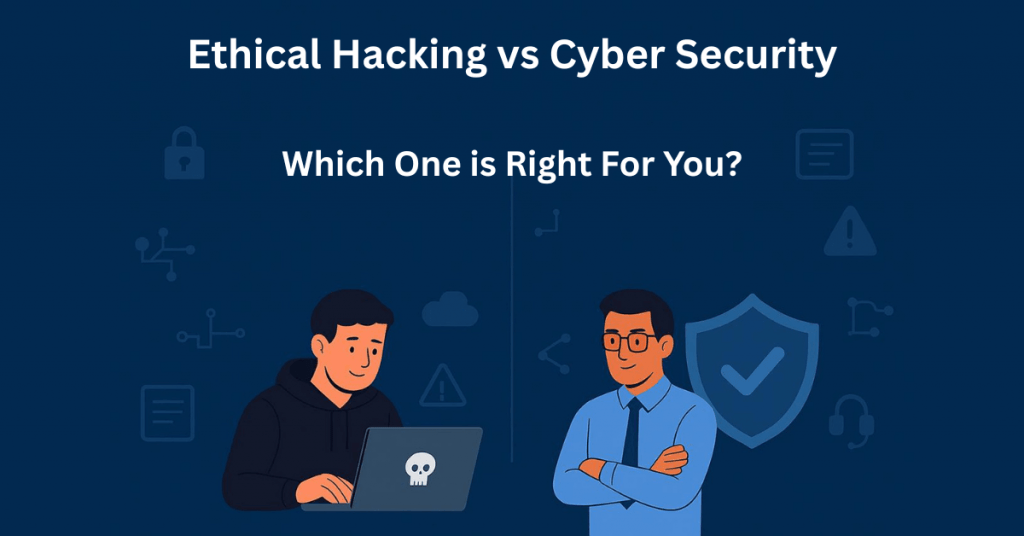What Is The Difference Between Ethical Hacking and CyberSecurity?

Have you ever imagined how companies such as Google, Facebook, or even your bank store your information out of reach of hackers? And how do they capture and prevent cyber criminals before they do the damage in a real sense? The solution is in two important domains: cybersecurity and ethical hacking.
Most individuals believe that the two are similar, but there is a big difference. Their jobs and functions are not identical, although both are concerned with online safety. In this blog, we will describe the meaning of ethical hacking and cybersecurity, how they can be differentiated, how they can work as a team, and which of them can suit the career of your choice.
What Does Cybersecurity Do?
- Protects your personal data, like passwords and bank details, from hackers
- Keeps computers, phones, and internet connections safe from viruses and attacks
- Uses tools like antivirus and firewalls to block harmful threats
- Watches systems daily to stop any unusual or unsafe activity
- Helps people and companies stay safe while using the internet
Types of Cybersecurity
- Network Security Solution: Secures your internet, Wi-Fi, and routers against hackers or viruses attempting to access information or damage your online system.
- Application Security Software: This security keeps the mobile applications and computer programs bug-free, hacker-free, and safe against other malicious attacks that can steal personal information.
- Cloud Security Services: Protects your files and photographs that you upload online (such as Google Drive or iCloud), in such a way that only you can use them safely.
- Data Security Software: Ensure that you keep your personal information, such as passwords, bank information, and ID numbers, secure without leakage, theft, or misuse.
Why Does Cybersecurity Matter?
Everything in the world today is carried out online. We go shopping, pay bills, store photos, talk to our friends, and even we manage our bank accounts. However, a system with even a single weak point can be compromised by hackers and create a serious mess. They are able to steal money, release confidential data, or destroy valuable services.
The most famous case is the Equifax data breach in 2017 that resulted in the theft of personal information of more than 140 million individuals. This consisted of names, addresses, and identification numbers. Cybersecurity software can be viewed as a digital security guard that safeguards computers, applications, and information at all times.
It stops bad people from getting in. Without it, our online world would not be safe for anyone, whether you are an individual or a company.

SentinelOne
Starting Price
Price on Request
Pros
- Protects personal data from hackers
- Keeps your money and online accounts safe
- Helps companies avoid major financial losses
- Builds trust with customers and users
- Protects systems 24 by 7 like a digital guard
Cons
- It can be expensive for small businesses
- Needs regular updates and maintenance
- Sometimes blocks safe websites or files by mistake
- Can slow down the computer or internet speed
- Skilled experts are required to manage it properly
What is Ethical Hacking?
Ethical hacking refers to hacking with the right intentions. It occurs when an individual, under the consent of the other party, attempts to hack into a computer system or the web platform with the aim of identifying any weak points. The aim is not to steal or destroy something, but to assist in repairing the issues before bad hackers can locate them.
These are the certified ethical hackers that are referred to as white hat hackers. They use the same tools and tricks as real hackers, except that they have been hired by companies, banks, or even by the government. Ethical hacking allows us to protect our data, money, and systems by checking their safety and demonstrating what should be changed or secured.

PureDome
Starting Price
$ 8.45
What Ethical Hackers Do?
- They perform penetration testing by trying to break into apps or websites to check for security issues.
- They use the same tools as cybercriminals, but in a legal and approved way.
- They help companies find and fix weak points in their security systems.
- They often work on bug bounty programs where they get paid to find mistakes or problems in websites or apps.
Types of Hackers
- White Hat Hackers: They are good people who hack legally in order to uncover security issues and prevent bad hackers from attacking systems or getting data.
- Black Hat Hackers: Bad hackers who hack into a system without authorization to steal funds, information, or destroy a system in order to make a profit or have fun.
- Grey Hat Hackers: These are hackers who identify problems without authorization, without harm, but they violate rules and can create dangerous circumstances.

TrendMicro Maximum Security
Starting Price
₹ 1973.00 excl. GST
Why Does Ethical Hacking Matter?
Ethical hacking is significant because it assists in securing our online world against real hackers. Nowadays, the internet is used to do things like shopping, banking, conversing, and even storing personal data. Bad hackers can break into a system, steal information, or cause damage in case there are weak points within it.
Computer-based white-hat hackers become online forms of bodyguards. They attempt to hack into applications not to destroy them but to identify issues in them, in order to get them fixed. This assists companies to be on the safe side, guarding people against loss of their confidential information and loss of money.
Ethical hackers make a big difference because, without them, a lot of security holes would not be found. Their resources ensure websites, applications, and digital solutions remain advanced and secure against all forms of attacks on a day-to-day basis.

Singularity Signal
Starting Price
Price on Request
Pros
- Helps find and fix security problems early
- Protects data and systems from real hackers
- Builds trust with customers and users
- Prevents financial and data loss
- Improves overall system safety and awareness
Cons
- It can be costly for small companies
- Needs skilled and trained professionals
- If done carelessly, it can cause damage
- Legal permission is always required
- Tools used can be misused if in the wrong hands
Key Differences Between Ethical Hacking and Cybersecurity

Now that we know what both terms mean, let’s look at how they are different.
| Features | Cybersecurity | Ethical Hacking |
|---|---|---|
| Goal | Protects systems, data, and networks | Finds and fixes weak spots before hackers do |
| Method | Uses defense methods like antivirus and firewalls | Uses offense methods like hacking tests and simulations |
| Work Style | Watches and blocks threats all the time | Uses offensive methods like hacking tests and simulations |
| Tools Used | Security software, antivirus, and monitoring tools | Hacking tools like Kali Linux, Burp Suite, Metasploit |
| Responsibility | Keeps everything secure and updated | Finds problems and helps fix them |
| Legal Framework | Works under company rules and IT policies | Needs official permission before testing or hacking |
| Focus Area | Overall protection of systems | Specific testing of apps, websites, or networks |
| Approach | Prevents attacks from happening | Simulates attacks to expose weak areas |
| Type of Work | Regular updates, monitoring, setting up security | Regular updates, monitoring, and setting up security |
| Outcome | A safe and secure environment for users and data | A stronger system after testing and fixing issues |
How Do They Work Together?
Although cybersecurity and ethical hacking are not the same, they act hand in hand. Ethical hackers attempt to hack into the system to identify the weak spots. The best cybersecurity specialists then resolve those issues and make the system strong. Some companies even use ethical hackers to test the safety of their systems on a regular basis. Some people work in both positions.
Think of a cybersecurity expert as a doctor who heals and secures the system. Ethical hackers are similar to lab testers who test where the disease is located. One identifies the problem, and the other is the solution.
Both of them are useful in protecting our phones, websites, and information on the internet so that a real hacker cannot easily access it. Digital systems would not be capable or prepared to face the actual threats without cooperation between them.

ThreatCop
Starting Price
Price on Request
Common Myths Busted
Myth 1: Ethical hacking is illegal
Truth: This becomes illegal when done without consent or authorization. Ethical hackers are professionals who do their work legitimately.
Myth 2: Cybersecurity has nothing to do with hacking
Truth: Most hacking professionals study the methods of hacking in order to learn how to prevent real hackers.
Myth 3: You must be a tech genius to learn ethical hacking
Truth: Cybersecurity or ethical hacking can be learned by anyone through interest, practice, and appropriate training.
Myth 4: Only big companies need cybersecurity
Truth: Even small businesses and individuals are under online threat and require protection.
Myth 5: Antivirus software alone is enough
Truth: Antivirus software is not enough to handle cybersecurity; various tools and a frequency of checks are required to maintain security.
Which One is Right for You?

Choosing between cybersecurity and ethical hacking depends on your interests and working style.
Cybersecurity is a good choice if you:
- Like protecting data and systems
- Enjoy setting up security tools and monitoring threats
- Want to prevent attacks before they happen
Ethical Hacking is good if you:
- Enjoy solving problems and thinking like a hacker
- Want to test systems for weak spots
- Like hands-on work with hacking tools (used legally)
Both careers are well-paying, in high demand, and work together to keep the digital world safe. Many people learn both skills and switch roles as they grow. No matter which one you choose, you’ll play a key part in making the internet a safer place for everyone.

Vortex
Starting Price
Price on Request
Final Thoughts
The internet plays a huge role in our lives today, and therefore, protecting it is a very serious issue. Ethical hacking and Cybersecurity are both beneficial in securing our data and systems. Cybersecurity helps prevent bad things. Ethical hacking ensures that issues are identified in advance by hackers. Both are required to ensure things are safe.
As an example, consider a bank. It is guarded to secure the money like cybersecurity. It also allows one to attempt to slip in and determine whether the security is tight. That is similar to ethical hacking. Both jobs will make the bank secure.
Such professions would suit individuals who like problem-solving and working with computers. It does not require you to be a genius to begin. Any person can enter this field with interest and learning. Regardless of whether you want to work to ensure the safety of systems or test them, there is an option.
Does this sound exciting? Perhaps it is time to do some research and find out where your interest can lead you.
Sweety Sharma is a skilled content writer with expertise in crafting engaging content across various platforms, including websites and social media. Since 2018, she has written extensively on topics such as cryptocurrencies, stocks, nutrition, investment, technology, real estate, marketing, and many more. During her journey, Sweety has improved... Read more








